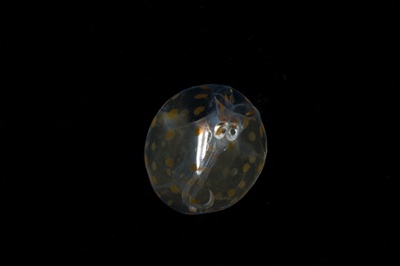Earlier last year, a team of scientists mapped over 1,500 square miles exploring the deep sea creatures living in the depths of the Mid-Atlantic Ridge. They used the latest technology to learn more about what was living in this remote and relatively unexplored deep-sea environment using remotely operated vehicles equipped with digital cameras.
With a suite of eight deep sea cameras they were able to capture images of life on the peaks and valleys of very rugged terrain. Trawls, traps and corers brought back thousands of specimens for study back in the laboratory.
Some of the images taken during the trip by photographer, David Shale, appeared in the National Geographic Society's daily news web site (nationalgeographic.com/news). The photo gallery on animals found during the expedition, led by Professor Monty Priede, Director of the University's highly-acclaimed Oceanlab, was one of the ten most viewed galleries for the year 2007.
Nationalgeographic.com/news has posted a ranking of its top ten galleries of 2007 and will re-use a photograph taken by David of a squid (Teuthowenia megalops).
David is delighted with the nationalgeographic.com/news honor and said: "When I take images, part of my remit is to share these with the scientific community, and to make then make these readily available for education and publicity purposes. One reason is that today, images are very important as they can stimulate interest in the deep sea and ocean science in general. If we can stimulate that and engender an interest and concern for our environment then I feel we have been successful.
"I am extremely proud to have been part of this expedition, however, the images are only a small part of the scientific research that was begun on this cruise."
Professor Priede led a team of international researchers whose work will continue the understanding of life in the deepest oceans and contribute to the global Census of Marine Life.
Over the course of five weeks, the team catalogued a host of exotic worms, colourful corals, unusual sea cucumbers and weird fish.
Exploring life in the North Atlantic Ocean at various depths of 800 to 3,500 metres, the team of 31 scientists were on a five-week scientific expedition which surfaced a wealth of new information and insights, stunning images and marine life specimens, with one species thought to be new to science.
The team followed the expedition along the Mid-Atlantic Ridge, an underwater mountain range from Iceland to the Azores islands west of Portugal, on board the £40 million Royal Research Ship James Cook. 
Until now the region had scarcely been explored because of its remoteness and depth. But, the new survey showed that the ridge is teeming with life, said Professor Priede.
"The Mid-Atlantic Ridge is roughly equivalent in size to the European Alps and is one of the largest areas of habitat available in the ocean", he added.
Professor Priede is delighted at the news that David's images are among the top ten nationalgeographic.com/news galleries of 2007. He said: "The marine researchers who took part in the expedition were able to explore new environments, find new animals and study global changes in the world's oceans. We found species that are extremely rare or unknown elsewhere in the world.
"I am so thrilled that David's images have been recognised by such a prestigious organisation as the National Geographic News."
The aim of the voyage was to contribute to the wider MAR-ECO project studying biodiversity along mid-ocean ridges (www.mar-eco.no) and to the global Census research programme. Census of Marine Life is a 10-year global scientific initiative to assess and explain the diversity, distribution and abundance of life in the oceans.


